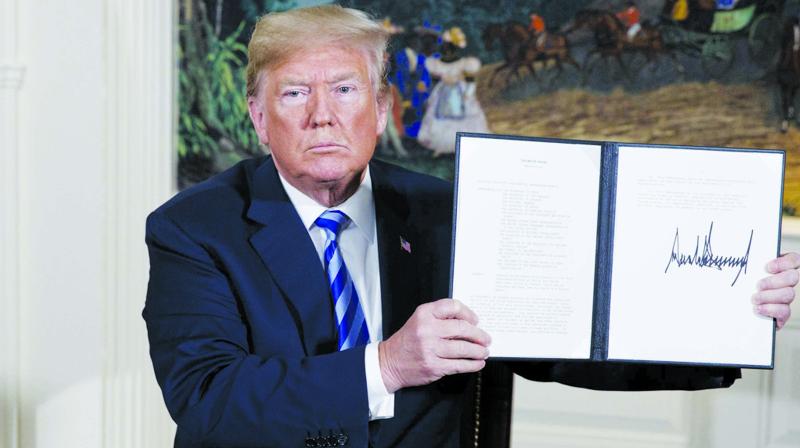Trump’s exit from the Iran deal is a sinister move
Much to the chagrin of India, who has long been Iran’s ally and the other trading partners, will also be impacted by this proposition.
The elephant in the room is how the pulling out of the deal makes the United States safer when it had the power to constrain Iran. History bears witness to America’s diplomatic imbroglios such as the George Bush government deciding to jettison the Clinton administration’s deal with North Korea, driving out the Non-Proliferation Treaty (NPT) has now only emboldened North Korea’s resolve to be on par with other nuclear powers, developing and testing its intercontinental ballistic missiles (ICBMs). In 1950s when the US had good relations with Iran’s leader, the Shah, it was the Americans to first give Iran its nuclear reactor, since then they have been working on their nuclear energy prowess.
There were better ways to deal with Israeli Prime Minister Benjamin Netanyahu’s claim backed by the US that Iran is breaching the agreement and carrying out underground nuclear weapons programme, but the US failing to keep its end of the bargain has set a wrong precedent, especially for countries like North Korea, damaging its credibility in their eyes. This move will have reverberations within Iran’s internal politics too as now it has given courage to the hardliners to challenge Hassan Rouhani and the Revolutionary Guards would put pressure to even withdraw from the NPT, and this would take the nuclear non-proliferation regime back to the 2001-2002 North Korea situation when they were not monitored and there were no restrictions on them.
After years of being stuck in a rut of multilateral and bilateral bromides, by signing the pact, permitting low-level enriching for power generation and other peaceful activities without having enough to build any weapon of mass destruction, they had bitten the bullet and decided to postpone the development to 15 years, the shelf life of the Obama era accord, but not completely compromising on its right to enrich.
The Joint Comprehensive Plan of Action (JCPOA) has been a cynosure of all eyes ever since it was tabled. It is definitely exhaustive and well thought out with long deliberations on its modalities. The basic ingredient of years of diplomacy only came to fruition when the US gave up their maximalist position, which was to completely deny Iran the right to enrich and Iranians agreeing on the postponement. Thus, US secretary of state Mike Pompeo’s threat to impose the “strongest sanctions in history” if Iran does not stop enrichment of uranium to the hilt, might still not be enough to lever them into compliance.
US’ sanctions and its infamous political tool to pressurise rival governments is nothing new for Iran, even before elections Donald Trump denounced its inking. But the bee in his bonnet has been mainly for two reasons, that it was a temporary deal and it was not a treaty but a framework where the deal required to be reviewed every few months and it was not a permanent solution. Second, the pace at which they are growing economically and getting wind back into its geo-political sails, engaging with Russia and China and building their economy on a fast track, by the end of 15 years the US would be amidst a David vs Goliath battle.
The US has also had issues with Iran’s terror funding for which it was declared a state sponsor of terrorism under the Reagan regime and it froze Iranian government’s assets in the US due to 1979 hostage crisis. His fears are not unfounded, as Iran has been sending financial aid to terror outfits like Hezbollah, which makes open threats to the West by helping them logistically. So the money JCPOA was supposed to generate for the betterment of the Iranian economy has been channelised to nefarious activities. Iran’s repeated attempts to convince that nuclear weapons and WMDs are against its defence doctrine have fallen on deaf ears since it has not been able to relax the rigours of the West and the Sunni majority countries as it has continued testing several missiles like the Ghadr-110, Qiam 1 and Khorramshahr ballistic missiles which raises suspicion. Although only the US has pulled out leaving the other participants in a quandary, it is not too long before Iran’s clock is reset to the pre-2015 period, as soon as the rest are also jostled into concurring with the US. The international clout of the US and its proselytising zeal hollows out any attempts made by its rivals like when it imposed a sanction on Russia due to its involvement in Kremlin and in response Russia shot itself in the foot by banning all dairy products from the US entering its economy. It only backfired resulting in a huge inflation in the Russian market.
It is no news that the US is like the sheikh of all the souks, controls the global financial system. So as soon as an economic sanction on Iran comes into effect, rest of the countries will not be able to trade with Iran as banking channels will freeze the assets, thereby closing avenues for its petrodollars. Much to the chagrin of India, who has long been its ally and the other trading partners, will also be impacted by this proposition. Recently reviving the peace pipeline or Iran-Pakistan-India (IPI) gas pipeline, which India had abandoned after the US sanctions on Iran in 2008, was in the works. India has received a slew of benefits by importing oil from Iran besides the cheaper price, freight discounts it also gets 90 days credit against the 30-day credit from other suppliers. This would be a major setback for the Chabahar port project and the North-South corridor passing through Iran which is to link India and Russia. From here on it is nothing but a tight ropewalk for India.
The writer is a lawyer


















